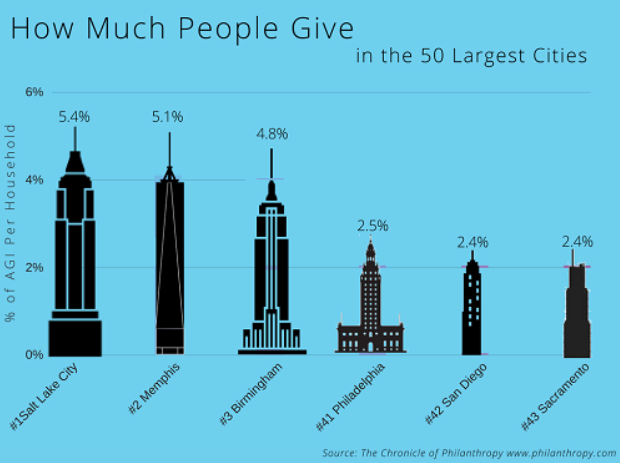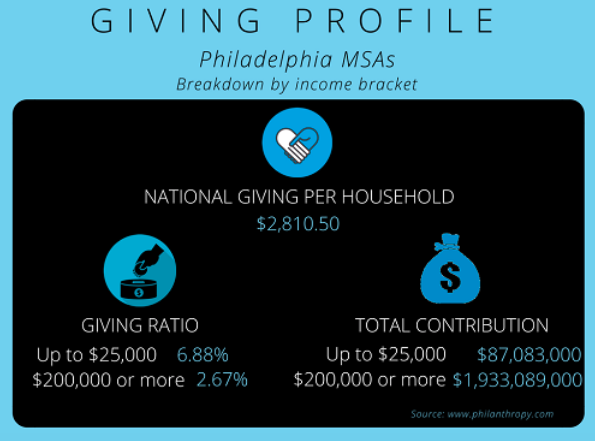The Citizen will publish guest articles, like this one, that add to the local civic discussion. To submit, click here.
Philadelphia has done a good job of organizing people in response to the immediate challenges to federal policies. People from all walks of life have joined together to say “no” to measures that reduce opportunities for people and communities. But resistance is not enough; it is equally critical to succeed in creating better futures for people and places in order to demonstrate that equitable public policies and practices generate results. What if we provide avenues for concerned people to be able to say “yes” to positive change by also organizing money?
How?

When it comes to philanthropic giving, we have a lot of room for improvement that would not be a heavy lift for any individual, but which can make a significant difference if we act collectively. Sad fact: the Philadelphia region ranks in the bottom 20 percent (41 out of 50) in per household philanthropic giving among America’s largest metropolitan areas. Salt Lake City is number one—maybe there is lots of tithing happening there—but that does not explain Memphis at number two or Birmingham at number three. Even Baltimore is considerably more generous than Philadelphia. New Orleans ranks right in the middle, with average annual giving of $3,391/household (2.8% of adjusted gross income or AGI). The typical Philadelphia region household donates $2,604 annually (2.5% AGI).

So here is a modest proposal: What if we simply increase our giving rate to the national average? There would be a net increase of $323 million per year in philanthropic giving to area nonprofits for a total of $4.4 billion (that’s billion, with a b). On a per day basis, this would cost the average household just $0.56 more than what they already contribute for a total of $7.70/day.
If this sounds like a lot, consider that Philadelphia’s low-income families already donate 6.9% of their AGI each year—far more than the average high-income families at 2.5%.

So how do we start a movement to greater philanthropic engagement? Experience in other efforts across the country and Philadelphia point to the fact that we can plan, organize, and make large-scale change in persistent behaviors. Nationally, there has been great success in getting people to wear seatbelts, put kids in car seats, and reduce smoking. Locally, we’ve recently organized the Read by 4th! campaign aimed at significantly increasing the number of students entering the 4th grade at reading level; Shared Prosperity, a coordinated effort to help lift citizens and communities out of poverty and increase opportunities for low-income people; and Shared Safety, a collective response to relational violence. These and other efforts began with a slightly audacious vision, people across sectors around a table, and a willingness to work together to create and implement a unified plan.
We’re thinking of this as collective impact philanthropy. Over perhaps the next three years, the region’s nonprofit and philanthropic leaders can work together to set a shared goal, develop and implement an action plan, and create a way to track success such that the region’s rate of household philanthropic giving would reach the national average. People would give directly to organizations of their choosing; the point is to create a greater and sustained culture of philanthropy throughout the Philadelphia region.
We think it’s worth the effort to raise an additional $323,000,000/year for good causes.
Exactly how would this happen? Let’s steal a page from the Paris Climate Agreement, i.e., rely on individual volunteer actions to achieve a collective good. Let’s:
- Create a commonly shared goal for annual philanthropic giving for the Philadelphia region.
- Raise broad public awareness to communicate the need, benefits, and path to success.
- Encourage giving to individual organizations of donors’ own choosing.
- Establish a mechanism to report and track success.
This needs to be a collective activity that goes beyond any one of our organizations. We’d love to hear from others regarding your ideas and interest in participating.
Don Kligerman is President and Partner of Fairmount Ventures, which helps nonprofits and other institutions with strategy, business development and fundraising.
Hader Photo: Howard Lake


